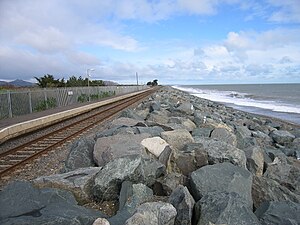Dublin–Rosslare railway line
This article needs additional citations for verification. (January 2022) |
| Dublin–Rosslare Main Line | |||
|---|---|---|---|
 Rock protection from flooding at Kilcoole | |||
| Overview | |||
| Status | Operational | ||
| Locale | East of Ireland | ||
| Termini | |||
| Stations | 29 | ||
| Service | |||
| Type | Commuter rail, Inter-city rail Heavy rail | ||
| System | Iarnród Éireann | ||
| Services | InterCity: Dublin–Rosslare South Eastern Commuter DART | ||
| Operator(s) | Iarnród Éireann | ||
| Depot(s) | Dublin Connolly | ||
| Rolling stock | 8100 Class (DART) 8500, 8510 and 8520 Classes (DART) 29000 Class (Commuter) 22000 Class (InterCity) | ||
| History | |||
| Opened | 17 December 1834 - 24 June 1882 | ||
| Technical | |||
| Line length | 104.375[mileage 1] mi (167.975 km) | ||
| Number of tracks | Double track (Dublin Connolly–Bray) Single track (Bray–Rosslare Europort) | ||
| Character | Tertiary | ||
| Track gauge | 1,600 mm (5 ft 3 in) Irish gauge | ||
| Electrification | 1,500 V DC OHLE (North of Greystones) | ||
| Operating speed | 60 mph (95 km/h) (Dublin–Greystones) 70 mph (110 km/h) (Greystones–Rosslare) | ||
| |||
Dublin to Rosslare | ||||||||||||||||||||||||||||||||||||||||||||||||||||||||||||||||||||||||||||||||||||||||||||||||||||||||||||||||||||||||||||||||||||||||||||||||||||||||||||||||||||||||||||||||||||||||||||||||||||||||||||||||||||||||||||||||||||||||||||||||||||||||||||||||||||||||||||||||||||||||||||||||||||||||||||||||||||||||||||||||||||||||||||||||||||||||||||||||||||||||||||||||||||||||||||||||||||||||||||||||||||||||||||||||||||||||||||||||||||||||||||||||||||||||||||||||||||||||||||||||||||||||||||||||||||||||||||||||||||||||||||||||||||||||||||||||||||||||||||||||||||||||||||||||||||||||||||||||||||||||||||||||||||||||||||||||||||||||||||||||||||||||||||||||||||||||||||||||||||||||||
|---|---|---|---|---|---|---|---|---|---|---|---|---|---|---|---|---|---|---|---|---|---|---|---|---|---|---|---|---|---|---|---|---|---|---|---|---|---|---|---|---|---|---|---|---|---|---|---|---|---|---|---|---|---|---|---|---|---|---|---|---|---|---|---|---|---|---|---|---|---|---|---|---|---|---|---|---|---|---|---|---|---|---|---|---|---|---|---|---|---|---|---|---|---|---|---|---|---|---|---|---|---|---|---|---|---|---|---|---|---|---|---|---|---|---|---|---|---|---|---|---|---|---|---|---|---|---|---|---|---|---|---|---|---|---|---|---|---|---|---|---|---|---|---|---|---|---|---|---|---|---|---|---|---|---|---|---|---|---|---|---|---|---|---|---|---|---|---|---|---|---|---|---|---|---|---|---|---|---|---|---|---|---|---|---|---|---|---|---|---|---|---|---|---|---|---|---|---|---|---|---|---|---|---|---|---|---|---|---|---|---|---|---|---|---|---|---|---|---|---|---|---|---|---|---|---|---|---|---|---|---|---|---|---|---|---|---|---|---|---|---|---|---|---|---|---|---|---|---|---|---|---|---|---|---|---|---|---|---|---|---|---|---|---|---|---|---|---|---|---|---|---|---|---|---|---|---|---|---|---|---|---|---|---|---|---|---|---|---|---|---|---|---|---|---|---|---|---|---|---|---|---|---|---|---|---|---|---|---|---|---|---|---|---|---|---|---|---|---|---|---|---|---|---|---|---|---|---|---|---|---|---|---|---|---|---|---|---|---|---|---|---|---|---|---|---|---|---|---|---|---|---|---|---|---|---|---|---|---|---|---|---|---|---|---|---|---|---|---|---|---|---|---|---|---|---|---|---|---|---|---|---|---|---|---|---|---|---|---|---|---|---|---|---|---|---|---|---|---|---|---|---|---|---|---|---|---|---|---|---|---|---|---|---|---|---|---|---|---|---|---|---|---|---|---|---|---|---|---|---|---|---|---|---|---|---|---|---|---|---|---|---|---|---|---|---|---|---|---|---|---|---|---|---|---|---|---|---|---|---|---|---|---|---|---|---|---|---|---|---|---|---|---|---|---|---|---|---|---|---|---|---|---|---|---|---|---|---|---|---|---|---|---|---|---|---|---|---|---|---|---|---|---|---|---|---|---|---|---|---|---|---|---|---|---|---|---|---|---|---|---|---|---|---|---|---|---|---|---|---|---|---|---|---|---|---|---|---|---|---|---|---|---|---|---|---|---|---|---|---|---|---|---|---|---|---|---|---|---|---|---|---|---|---|---|---|---|---|---|---|---|---|---|---|---|---|---|---|---|---|---|---|---|---|---|---|---|---|---|---|---|---|---|---|---|---|---|---|---|---|---|---|---|---|---|---|---|---|---|---|---|---|---|---|---|---|---|---|---|---|---|---|---|---|---|---|---|---|---|---|---|---|---|---|---|---|---|---|---|---|---|---|---|---|---|---|---|---|---|---|---|---|---|---|---|---|---|---|---|---|---|---|---|---|---|---|---|---|---|---|---|---|---|---|---|---|---|---|---|---|---|---|---|
| ||||||||||||||||||||||||||||||||||||||||||||||||||||||||||||||||||||||||||||||||||||||||||||||||||||||||||||||||||||||||||||||||||||||||||||||||||||||||||||||||||||||||||||||||||||||||||||||||||||||||||||||||||||||||||||||||||||||||||||||||||||||||||||||||||||||||||||||||||||||||||||||||||||||||||||||||||||||||||||||||||||||||||||||||||||||||||||||||||||||||||||||||||||||||||||||||||||||||||||||||||||||||||||||||||||||||||||||||||||||||||||||||||||||||||||||||||||||||||||||||||||||||||||||||||||||||||||||||||||||||||||||||||||||||||||||||||||||||||||||||||||||||||||||||||||||||||||||||||||||||||||||||||||||||||||||||||||||||||||||||||||||||||||||||||||||||||||||||||||||||||
The Dublin-Rosslare Main Line is a main rail route between Dublin Connolly station and Rosslare Europort, where it connects with ferry services to the United Kingdom and mainland Europe. The line between Dublin and Greystones is electrified and forms the southern part of the DART service. Between Bray and Rosslare the line is single track only.[2] The line connected with the Limerick–Rosslare line outside Rosslare Strand until 2010. From Wicklow on, semaphore signalling was used until April 2008, when the entire line was upgraded to the mini-CTC system controlled from Dublin Connolly. Although it is designated as a separate route, the line is continuous after Dublin Connolly, where it connects with the Belfast–Dublin main line. The section between Westland Row (now Dublin Pearse) and a point on the line just after Salthill and Monkstown station is the oldest railway line in Ireland, and the first commuter railway in the world, opening in 1834. It was then known as the Dublin & Kingstown Railway. At that time, the railway terminated adjacent to the start of Dún Laoghaire Harbour's West Pier, at a station called Kingstown.[3]
Passenger services
[edit]This section may be in need of reorganization to comply with Wikipedia's layout guidelines. (May 2022) |
- Monday-Friday
4 trains Dublin to Rosslare
1 train Dublin to Wexford
3 trains Rosslare to Dublin
1 train Rosslare to Dundalk
1 train Gorey to Dublin
- Saturday
3 trains in each direction Dublin to Rosslare
1 train Gorey to Dundalk
- Sunday
3 trains in each direction Dublin to Rosslare
Freight services
[edit]No freight services operate on this route as of 2022. Up until 2002, ammonia and fertiliser trains operated from Shelton Abbey near Arklow, where a fertilizer plant was located. However, this closed in late 2002, since when there have been no regular freight trains on this line. Bagged cement trains also operated in the past to Arklow and Gorey.
Heritage services
[edit]On a few Sundays during the summer the Railway Preservation Society of Ireland operates the "Sea Breeze", a steam hauled train with heritage carriages, between Dublin and Wexford/Rosslare.
Traction
[edit]
From late July 2004, Dublin-Rosslare services have been worked exclusively by diesel railcars. Initially the railcars used were drawn from the 2700 Class fleet, but these were replaced within a year. At present, most services are worked by the 22000 Class, of which there are four carriage sets, with the 29000 Class working some services. Prior to July 2004, services were worked by sets of Mark 2D carriages hauled by 071 class locomotives.
Signalling
[edit]In April 2008, the signalling on this route was upgraded to the mini-CTC system, controlled from a signalling control centre at Greystones Station. Apart from the Limerick Junction station area on the Dublin-Cork route, which was itself upgraded to CTC in 2011, it had been the last of the routes radiating from Dublin to use Electric Train Staff (ETS) and semaphore signalling, which was still in place south of Wicklow up until April 2008.
Many of its signal cabins were situated on the corner of a footbridge. Examples include Wicklow, Rathdrum, Arklow and Gorey. At present these cabins remain in situ.
Main connections
[edit]This line connects at Dublin Connolly with the Enterprise service onwards to Belfast Lanyon Place as well as the Sligo Line, for all stations to Sligo MacDiarmada.
DART trains connect with the line at all stations between Greystones and Dublin Connolly.
There are also connections at Rosslare Europort by Stena Line[4] to Fishguard Harbour to the West Wales Line for destinations such as Carmarthen, Swansea and Cardiff Central,[5] where you can continue your journey to Reading and London Paddington.[6] Irish Ferries[7] also operate ferries to Pembroke Dock.
See also
[edit]Notes
[edit]References
[edit]- ^ Reidy, Michael (30 October 2021). Network Statement (PDF) (2022 ed.). Irish Rail. pp. 85–87. Retrieved 21 September 2022.
- ^ Reidy, Michael (30 October 2021). Network Statement (PDF) (2022 ed.). Irish Rail. p. 41. Retrieved 21 September 2022.
- ^ "The History Press | 10 facts about the first Irish railway". www.thehistorypress.co.uk. Retrieved 16 January 2022.
- ^ "Irish Sea Ferries | UK Ferry Routes | Stena Line". www.stenaline.ie. Retrieved 16 January 2022.
- ^ "Homepage | Transport for Wales". tfw.wales. Retrieved 16 January 2022.
- ^ "Buy Cheap Train Tickets | Great Western Railway | First Great Western". www.gwr.com. Retrieved 16 January 2022.
- ^ "Ferry To France From Ireland & Britain | Ferry To France". www.irishferries.com. Retrieved 16 January 2022.

